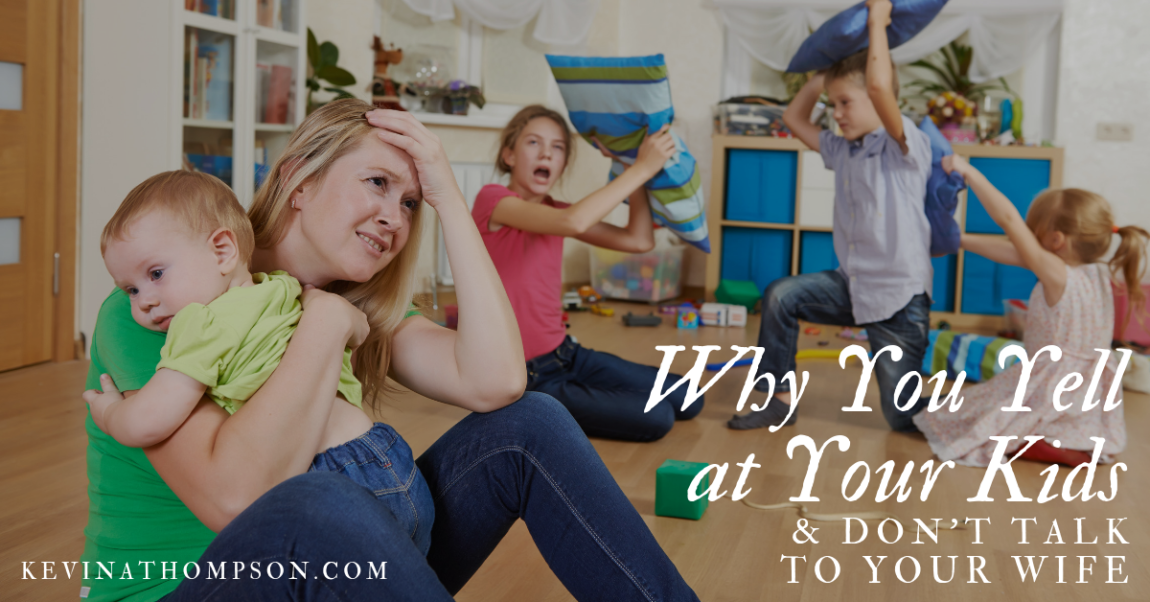You are afraid. It doesn’t feel like fear. No one believes it’s fear. But the reason you yell at your kids and don’t talk to your wife is because of fear.
Fear is so prevalent in our lives that we have grown accustomed to it. We don’t think about air until we struggle to breath. It’s around us at all times so we forget it is there. The same is true with fear. So how do we know when fear is present?
For our ancestors, it was easier to recognize the presence of fear. When a threat was identified outside the camp, our ancestors basically had three choices. They could fight, flee, or freeze. It’s called the fight or flight response. Scientists have since added freeze to the theory and collapse is sometimes added. If an army was approaching or an animal was about to attack, they could go after the threat and fight it, run from the threat by fleeing, or just freeze in hopes the threat would not see them.
It was true a few thousand years ago and true today. If someone breaks in your home, fight, flight, or freeze are your options.
Yet how do you respond when:
Your wife says we need to talk.
You teenager comes in after curfew.
Your toddler won’t stay in their bed.
Those are not scenarios in which fight, flight, or freeze should be in place. They all require effort and energy to figure out the right course, but they should not be a legitimate threat to our lives that cause us to respond with fear. But how often do we do just that?
There are times in which fight, flight, or freeze are proper responses, but they are always a response from fear. Sometimes we should be afraid, but we should not live in a constant state of fear. Our homes should not be defined by fear. While we might try to protect those we love from outside forces, we should never fear one another. Instead, our interactions and the climate of our homes should be defined by love. Fight, flight, or freeze have little place in the most important relationships of our lives.
Yet so often we:
Fight. Rather than having a productive conversation with our spouse about an important issue, the interaction quickly devolves into a fight. Social media might be the ultimate example of how much fear is in our culture. Facebook fights and Twitter haters are just byproducts of fear. There are a variety of reasons why many interactions between teenagers and their parents are contentious, but fear is the greatest driver. Both parties are terrified of change, their current uncertainty, and what the future might hold. Full of fear, they fight. When our heart rate rises, our tone stiffens, our voices raise, and our muscles tighten, we need to determine of what we are afraid.
Flight. Someone can tell something is wrong. They ask how you are doing and you respond, “fine.” Whether it’s your spouse, boss, co-worker, or friend, hiding your true feelings is a form of flight. You don’t want to engage the issue at hand so you deny it by running. There is a right time to flee, but far more often we use flight as a way to avoid conversations with others or a confrontation with our own emotions. We flee circumstances, relationships, accountability, and tensions. At the times in which we should fully engage the totality of who we are with the situation before us, we run. We do so because we are afraid.
Freeze. You are at the barber shop. All five chairs are filled by customers getting their haircut and many people are waiting for their turn. There are several quiet side-conversations happening, but there is one main conversation taking place. The issue is about border security. People have differing opinions but the conversation is good when suddenly an older man says, “All those illegals are just murderers and rapists.” The statement is racist. It totally ignores statistics and the undocumented people you regularly interact with on a daily basis. Said from ignorance and bigotry, no one refutes it. Afraid of tension, of being considered un-American, or of being singled out, no one says anything. Because of fear everyone freezes.
Fight, flight, and freeze characterize our actions far more than we realize. While these responses can protect us when true danger is present, they hurt us when we wrongly respond to a circumstance out of fear. What protects us from danger becomes a danger when wrongly applied. The home is made for love, not fear.
Love doesn’t respond with fight, flight, or freeze. It responds with a courageous engagement of self. Instead of fighting, it might peacefully listen or let another person have a differing opinion or engage in a meaningful conversation. Instead of fleeing, love causes us to move toward people, embrace the tension, and actively attempt to serve others. Instead of freezing, love drives us to action. It calls us out of ourselves and into engagement.
Fear is evidenced, in part, by our regular use of fight, flight, or freeze. It’s a good response when a real threat is on the horizon, but it’s rarely the right response at home. Learn it. Recognize it. Then choose a different way.



